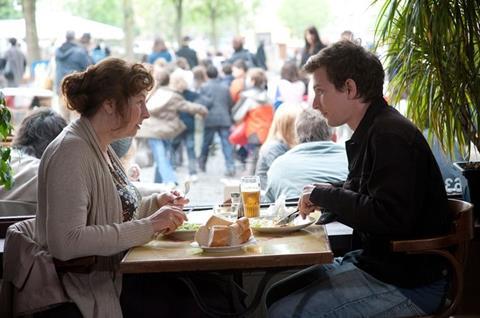Dir: Martin Provost. France-Belgium. 2011. 103mins

After an abusive man kills a young woman by accident, his long-suffering wife kills him on purpose in The Long Falling. Re-teaming of writer-director Martin Provost with his Seraphine star Yolande Moreau is very unlikely to approach that film’s word-of-mouth success capped by seven Cesars in 2009 (including Best Actress and Film) but does provide another tailor-made vehicle for Moreau’s singular looks and talent.
A sometimes convincing and sometimes stagey mini-odyssey.
Transposing Keith Ridgway’s 1998 novel from rural Ireland and Dublin to rural Belgium and Brussels, The Long Falling (Ou va la nuit) offers a slow-burning portrait of Rose Mayer (Moreau), a woman who has - until now - accepted a life devoid of affection.
She frees herself from one unfair and oppressive situation whose contours she knew by heart only to lock herself into one that’s also untenable but brand new: that of a murderess who leaves her farm for Brussels to try and commune with her only son, an openly gay lad who left home at 16 to escape his brutal father.
Ridgway’s crisp, compelling prose has inspired a movie that starts out with raw power but ambles along with varying rewards. Call it getting away with murder vs murder with getting away.
Twenty-five-year-old Thomas (Pierre Moure) lives in his male lover’s (Valentjin Dhaenens) house, where Rose comes to stay after methodically washing the bloodstains off the chassis of the family car and packing a handful of belongings.
Nobody notices that Rose is shell-shocked because her customary expression is that of a wide-eyed child who just swallowed a goldfish.
Something about the fleshy country-dweller who doesn’t say much inspires an almost atavistic sympathy in those she meets. Two of her son’s urban friends take an immediate interest in Rose; a lawyer, Marina (Servane Ducorps) and a journalist, Denis (Laurent Capelluto).Thomas isn’t sure how he feels toward his mother, until he takes decisive actions that influence her future.
Two supporting characters are extremely interesting. There’s a police detective (Jan Hammenecker) from Rose’s village who knows some of the details of her wretched marriage. He is strangely attuned to the manner in which she cracked but duty-bound to track her down and arrest her if there’s evidence that she’s the person who ran over her husband on the same rural road where he drunkenly hit and killed the girl.
And, in the big city, vet Edith Scob is captivatingly forthright as a widow who accepts Rose as a lodger and - with zero prompting from Rose - establishes a conspiratorial bond with her that leads to the low-key art film version of a chase scene.
The film is episodic in its accretion of details with little forward momentum except the gnawing inevitability that a woman who wasn’t exactly grief-stricken at her husband’s funeral and who split town without mentioning her destination might be asking for trouble. We are apparently meant to understand that in some perverse motherly way, Rose’s criminal act was motivated by love for the very son she alienated through her spousal loyalty.
Viewers who buy that explanation will be moved by the conclusion, but those who don’t will experience a sometimes convincing and sometimes stagey mini-odyssey about what happens when intrinsic goodness is worn down by abuse.
Production companies: Christmas in July, Artemis Film, F Comme Film
International sales: Roissy Films
Producers: Julie Salvador, Christophe Jeauffroy
Screenplay: Martin Provost, Marc Abdelnour, based on Keith Ridgway’s novel The Long Falling
Cinematography: Agnès Godard
Production designer: Catherine Jarrier-Prieur
Editor: Ludo Troch
Music: Hugues Tabar-Nouval
Main cast: Yolande Moreau, Pierre Moure, Edith Scob, Jan Hammenecker, Laurent Capelluto, Loïc Pichon, Servane Ducorps, Valentjin Dhaenens





















